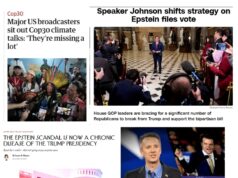by Jon Sokolow
For at least eighteen months, and perhaps longer, the office of former Virginia Governor Terry McAuliffe engaged in secret discussions to absolve Dominion Energy and its partners of liabilities associated with their $7 billion, 600-mile-long Atlantic Coast Pipeline (ACP). According to documents obtained exclusively by this writer, negotiations over the $58 million agreement started long before the ACP had received a single approval from state or federal authorities. In fact, Governor McAuliffe’s office participated in these discussions while permit applications were pending, and state officials deliberately kept those discussions secret.
In early February, we broke the story about the secret ACP immunity deal that McAuliffe signed in late December 2017, just before he left office. We noted that the agreement included waivers for any damages greater than $58 million to Virginia’s forests and water resources, as well as a catch-all waiver that said the payment represents “the full extent of natural resources-related mitigation measures and investments contemplated” for the pipelines. And we noted that “McAuliffe did this before the pipeline has even been approved – it still has not been approved – much less built.”
In March, we reported another shocker: the liability waiver that Virginia gave to Dominion and another set of waivers for the Mountain Valley Pipeline companies, contrasted sharply with another $58 million agreement that North Carolina Governor Roy Cooper signed with the Atlantic Coast Pipeline. The North Carolina deal included no waiver provisions. Instead, it said that “nothing in this Memorandum shall be construed as precluding or otherwise barring the State of North Carolina from recovering damages or equitable remedies from Atlantic for spills or leaks stemming from the ACP.”
And now, according to internal DEQ communications, it turns out that McAuliffe’s office was negotiating the waiver deal with Dominion as far back as June 2016, a full eighteen months before the agreement was signed.
In an email published here for the first time, a DEQ employee asked Bettina Sullivan, a DEQ manager, how DEQ might respond to “citizen concerns about how we are going to permit them re: wetlands.” Sullivan responded by saying: “it’s my understanding that the Governor’s office is working on a larger mitigation agreement with ACP.” Sullivan then told the DEQ employee that “I’m sure we can come up with some language that addresses it without divulging those negotiations.”
And there’s more.
It appears that David Paylor, recently reappointed as head of DEQ by Ralph Northam, knew that DEQ had participated in the liability waiver negotiations while his agency was “reviewing” Dominion’s permit application. Within an hour after our February 2 liability waiver story went on line, DEQ’s Public Information officer Ann Regn, who was juggling multiple press inquiries, suggested to Paylor that DEQ deny any prior knowledge of the waiver deal by telling reporters that “DEQ did not participate in the agreement process.” Paylor told her not to say that.
Instead, Paylor told Regn to say “the elements of the mitigation agreement are largely outside the purview of DEQ.” In dictating that response, which is exactly what Regn told reporters, Paylor apparently wanted to convey the impression that DEQ was not involved with the waiver agreements (because they were “largely outside the purview of DEQ”) without outright denying involvement, as his press officer had suggested. It is a fair inference that Paylor did this because he knew of DEQ’s involvement. It is no wonder that Ralph Northam’s decision to reappoint Paylor to head DEQ has been described as a raised middle finger to Virginia’s environment. Paylor showed that same finger to member of the Virginia press corps.
Paylor’s dissembling was not the only time that day that Virginia officials tried to mislead the press about the Dominion deal. While Paylor was telling his press officer how to carefully distance DEQ from the Dominion deal, Ralph Northam’s spokesman, Brian “DeCoy” Coy was telling reporters that the waiver provisions in the Dominion deal were not a waiver after all.
It is bad enough that the Governor’s Office engaged in secret discussions with Dominion that ultimately led to agreements with liability waivers that even the Governor of North Carolina – a supporter of the Atlantic Coast Pipeline – could not stomach. What is worse is that Terry McAuliffe was negotiating these waiver agreements at the same time that DEQ, led by his appointee David Paylor, was deciding whether or not to approve Dominion’s permit application. The less worse deal signed in North Carolina has been called a pay to play scheme and a slush fund. It has led to constant press coverage and legislative investigations. But in Virginia, with liability waivers in place, there seems to be a bi-partisan conspiracy of silence. Maybe silence whenever Dominion is involved is the “Virginia (Look the Other) Way.”
It now is clear exactly why Terry McAuliffe wanted to keep his Dominion negotiations secret until after he left office. In response to a Freedom of Information Act request with the Office of the Governor, we were referred to the Library of Virginia, because, as McAuliffe no doubt knows, all records from his office were transferred to the Library of Virginia the day he left office. The Library of Virginia has a policy of not releasing any records from the governor’s office until all records of that governor have been “catalogued,” a process that can take a decade or more. The Library still is “cataloguing” records from the administration of Tim Kaine, who left office in 2010.
So some of Terry McAuliffe’s Dominion immunity deal secrets are safely hidden away. For now. Or are they?
Stay tuned.













![[UPDATED with Jim Ryan’s Letter] In Response to Youngkin’s “Sad, Whiny” Letter to Spanberger About UVA, VA Senate Majority Leader Surovell Says He’s “truly embarrassed for Gov Youngkin…After 4 yrs he has no understanding of basic VA govt structure”](https://bluevirginia.us/wp-content/uploads/2025/11/youngkinspanuva3-100x75.jpg)